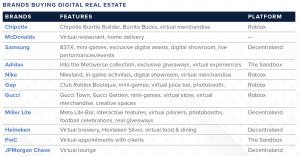The value of the metaverse
The metaverse is an experimental space intended to create an immersive experience, with the potential to create large value for retailers, allowing brands to connect with consumers on a whole new level. Interestingly, the majority of brands that partake today are food & beverage or apparel brands. These retailers are utilizing the metaverse to engage with consumers while providing value to customers. While some struggle to understand the concept or even explain what the metaverse is, retailers anticipate the virtual world will monumentally impact how consumers shop. According to projections calculated by McKinsey & Company, the metaverse is expected to generate $5 trillion by 2030, with $2 to $2.6 trillion coming from e-commerce.
In a survey conducted by McKinsey & Company, 64 percent of consumers indicated they were excited or very excited about shopping in the metaverse, and 79 percent said they preferred immersive world shopping.

Who is buying virtual real estate?
The buzz surrounding the metaverse has not gone unnoticed, as brands begin to enter the metaverse for their stake in the virtual reality concept. So, who is buying real estate in the metaverse?


How brands are leveraging the metaverse
Chipotle has recently rolled out an in-game activity in Roblox, an online game platform with a large young audience, that consists of simply rolling a burrito. The activity earns players in-game currency converted into entrée codes on the burrito chain’s digital platforms. It provides a new experience for younger customers, building relationships with those who participate in the game.
Buying real estate in the virtual world offers significantly new and endless marketing opportunities. Hosting pop-up events help drive short-term engagement but buying land guarantees a long-term presence and impact within a metaverse platform.

Gucci has created a virtual piazza called Gucci Town, featuring mini-games, designated areas to create art pieces, an exhibition, and a digital shop in Roblox. These virtual spaces show how the luxury brand is experimenting with different forms of retail experiences. The brand looks to drive revenue and engagement in the virtual world through Gucci Town. Its shop is probably the most critical feature as it can showcase new products and collaborations and allow users to purchase items with Robux, the game’s digital currency, to outfit their avatars. Gucci made headlines when it sold a handbag in-game for 350,000 Robux, the equivalent of $4,115.
Samsung launched a metaverse location in Decentraland, Samsung 837X, designed after its Samsung 837 location in New York City, NY. The online space provides an immersive experience through games, product introductions that allow consumers to interact with various products directly, and live performances/events.
Walmart plans to create its own cryptocurrency and non-fungible tokens (NFTs), as indicated by the big-box retailer filing several new trademarks to make and sell virtual merchandise, ranging from electronics to toys to personal care products. This could eventually extend to users making orders through the metaverse for home deliveries. The big-box retailer is considering developing its own metaverse.
CVS also made several trademark filings with the intent to sell downloadable virtual goods in the form of NFTs for use online and in virtual worlds. CVS explained that it would like to use its metaverse location to leverage its telehealth services and help reach areas of non-emergent health and nutrition and wellness services.









